#Street Religion
Text
SERVIN' CUTTYS GOT DA BLOCK HOT... DAT SHIT IN MY GENES............ 🤲🏾🙏🏾👺📿
#GRAFFPORN#ARCTERYX#KOBRA PAINT#FATJAY#THE NORTHFACE#SKRILLA#NTER#GRAFFITI#DRIP NYC#UNDERGROUND#HARM8#GRAFF#GORETEX#CHINATOWN#BRICK CITY#TRISTATE#MOP TAGS#TAGS AND THROWS#STREET RELIGION
28 notes
·
View notes
Text
not being able to find older bf!simon around the house and while you’re looking for him, you catch something out the window-
nearly all the women in your neighbourhood gathered at the end of your driveway
you come outside to investigate only to find them with their attention glued to the front of your car, it’s not till you walk around the front you find the lower half of simon sticking out from under it
on his back, knees bent, massive boots planted into the concrete, bare arm occasionally stretching out to find another tool
“you alright, si?”
you hear him grunt before he’s calling out to you
“yeah, i’m right sweet’art- sortin’ out that bit thas’ been givin’ y’grief”
breaking your gaze from his massive thighs flexing under his jeans, you scan back over the crowd that’d formed
all of them married, all of them a good ten years older than even he was- you couldn’t really blame them really, you had eyes
you could hear him shuffling out from under the car before he suddenly straightened to full height, wiping greasy hands on the front of his old-white-singlet
he pulled up the bottom of it to swipe his forehead and you think you heard someone gasp
wrapping a firm arm around you, he gives your backside a pat before he kisses the top of your head
“got t’keep y’safe, y’know?”
“thank you, baby- now be polite and say hello to your audience”
oblivious as ever to anything other than you, simon threw a look over his shoulder before he followed you back into the house
“oh, ‘ello ladies”
(someone throws a street barbecue and you force simon to talk to the other men around the burner and multiple husbands request him to start “doing that shit” in the garage with the door shut, please)
#idk what this lil thing is but have it#it’s based on the elderly lady on one street with a crush on my boyfriend that could outlast religion#she’s my favourite person she lets me gush about him with her#older bf!simon#simon riley x reader#simon ghost riley x reader
13K notes
·
View notes
Text
ah ha ha no girl don't use Vampirism, Religion, and/or Cannibalism as a metaphor for all consuming love and obsession you're so sexy ah ha
#midnight mass#bones and all#yellow jackets#bg3#astarion#father paul#father paul hill#father pruitt#john pruitt#father john pruitt#vampire#religion#obessive love#sweeney todd#mrs lovett#sweeney todd the demon barber of fleet street#hannibal#hannigram#hannibal lecter#william graham#castlevania#no comment
13K notes
·
View notes
Text
religion is one of the most prominent recurring themes on the album, and it has been present in some capacity for quite a few records now. taylor previously compared love to religion: her saving grace, her belief system, and a fated divine intervention (false god, cornelia street, and cruel summer are the best examples of this). ‘sacred new beginnings that became my religion’ and ‘we’d still worship this love even if it’s a false god’ are two of the defining statements about her philosophy on the lover album.
taylor doesn’t want to leave all of that behind on ttpd, at least not at the beginning. the first supernatural force she mentions is the spaceship on down bad, which she compares to a skylight of freedom in the epilogue. *something* has finally come to save her from her life of suffering. she doesn’t care if it’s a force of good at first; if anything, she’s just fine being taken away by aliens. she views this man as her destiny. it isn’t until guilty as sin? that taylor starts to ponder the moral implications of what she’s doing. is she guilty as sin for wanting to leave her previous religion and relationship behind? she comes to the conclusion that, even if she rolls the stone away and gets resurrected/redeemed, she cannot avoid the fallout. she is okay with the thought of having to wait, as long as both lovers vow to be together forever, just as she once did with someone else in false god. ‘I choose you and me religiously’ finishes the bridge of the song in a direct callback to cornelia street.
the next mention of religion has murkier imagery. she claims that she does not need the Lord’s help to save this man. she sees the halo that he has, and she can fix him herself. now that she feels free of her prior cage, she isn’t looking for divine intervention anymore. she wants control. she is their route to salvation.
when the relationship falls apart, she retreats back into the position of a believer rather than a divine figure. she compares him to a Holy Ghost who promised to save her and take her to heaven. instead, she is in hell in every sense of the word: she’s down bad and feels guilty for digging up the grave. he was a jehovah’s witness who promised that she could break free of the cage imposed by love without changing her religion altogether; she would’ve just had to switch denominations. she could still have a marriage and kids! she could still have a blue tortured poet! the man was different, but not the dreams they had together. the story of the first part of the album ends here. her faith has been broken, and she has only found any semblance of sanity by refusing to mention these belief systems altogether.
side b/the anthology blends the christian imagery of side a with goddesses, sorcerers, and prophecies. she bargains with these powers to let her have the future she wants (the prophecy). she doesn’t sound like someone believing in salvation. if anything, she feels cursed. she decides that the concept of divinely ordained timing will never work in certain relationships (‘the goddess of timing once found us beguiling / she said she was trying / peter, was she lying?’). this disdain extends onto her perception of other people’s faith (‘bet they never spared a prayer for my soul’). she does position herself as a prophet in cassandra, but even then, she admits that the role has hurt her. perhaps the pain in thank you aimee was meant to be, or perhaps she was just strong enough to build a legacy in spite of it, boulder by boulder. is she a martyr? does she want to be? or did she save herself?
the only real love song on this half of the album makes no mention of fate or any divine forces. it wasn’t meant to be. it’s not a supernatural invisible string or lightning in a bottle. she is just in love.
the album ends with the manuscript, which revisits an old story of a defining, formative heartbreak. as she sings ‘at last, she knew what the agony had been for’ while describing the legacy of her writing, she seems to revert to thinking about the purpose of trauma. the only exception is that, in this case, she is the one who found meaning in her pain by turning it into a manuscript. writing is her belief system now, and she proselytizes by telling her stories and thus giving up the manuscript.
ultimately, her belief in destiny has chewed her up and spat her out. she so desperately clung to her existing belief systems that she was fooled by a conman, which left her feeling cursed. religion is supposed to be with someone even in their darkest moments, but the album explains that taylor often felt abandoned. the only constant in her life was, well, herself. she’ll be okay, but her pen will be her saving grace.
#idk why I wrote this essay but it needed to be said#this could be taken further by actually unpacking each mention of religion on midnights and lover but i ain’t doing all that#the manuscript#cassandra#Cornelia street#false god#cruel summer#lover#the prophecy#the smallest man who ever lived#but daddy I love him#I can fix him#guilty as sin#ttpd#thank you Aimee#peter
992 notes
·
View notes
Text



Jayda Cheaves x True Religion (2023)
#styleinspo#aesthetic#women's style#fashion#styleinspiration#fashion aesthetic#outfit inspiration#hairstyle#black women#fashion lookbook#street fashion#fashion looks#black fashion#fashion moodboard#true religion
455 notes
·
View notes
Text

Prayer flags - near Khamar Monastery, sainshand, 2024
#original photographers#photographers on tumblr#travel#mongolia#prayer flags#landscapes#street photography#streetphoto color#buddhism#religion
117 notes
·
View notes
Photo

March 24, 2023 - A hate preacher harassing students at the University of Oklahoma accosts a counter-protester that was drowning out his hateful nonsense and gets what he deserves. [video]
#karma#hate preacher#antifa#antifascism#antifascist action#direct action#gif#2023#usa#oklahoma#university of oklahoma#preacher#christianity#street preacher#christofascism#religion
914 notes
·
View notes
Text
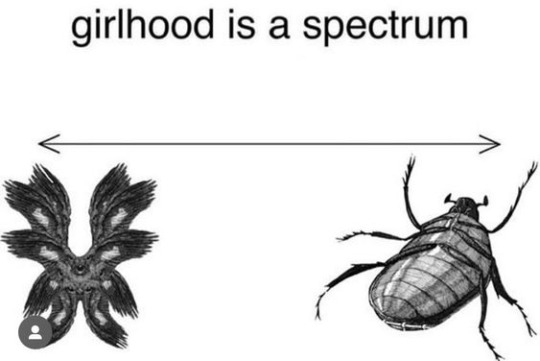
Girlhood is a spectrum: biblicially accurate angel <--> gregor samsa
#i saw this on pinterst and had to put it here like a sticker in my journal#its a spectrum that fluctuates with the passage of time#absolute mood#letters to myself#chaotic academia#franz kafka#on religion#on faith#biblically accurate angel#gregor samsa#metamorphosis#kafkaesque#HAHAHAH OMG KAFKAESQUE#anyway yeah; tis the vibe#meme#media#anderson don’t talk out loud. you lower the iqueue of the whole street.#SO MANY TAGS WHAT appologies#okay back to study i just needed a snack+nap+pinterest break#girlhood is a spectrum
205 notes
·
View notes
Text

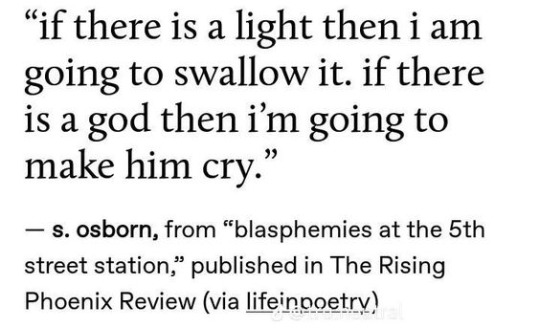





i will do as devils do. fall.
Sylvia Plath The Unabridged Journals of Sylvia Plath / S. Osborn Blasphemies at the 5th Street Station / Kate Cayley Lent / retirementfund (on etsy) BEGOTTN HORROR PATCH / Ethel Cain Sun Bleached Files / Nicola Yoon The Sun is Also a Star / unknown
i. Sylvia Plath, The Unabridged Journals of Sylvia Plath
[ "I need a father. I need a mother. I need some older, wiser being to cry to. I talk to God, but the sky is empty." ]
ii. S. Osborn, Blasphemies at the 5th Street Station
[ " 'if there is a light then i am going to swallow it. if there is a god then i'm going to make him cry.' / - s. osborn, from 'blasphemies at the 5th street station,' published in The Rising Phoenix Review (via lifeinpoetry)" ]
iii. Kate Cayley, Lent
[ "When I think of God, I think of hiding. The way a child hides. In hope of being found." ]
iv. retirementfund, BEGOTTN HORROR PATCH
[ Black patch with a screenshot form the horror movie Begotten. A grainy black and white image of a woman standing as she looks down at something. "GOD IS DEAD / ALL HAIL NATURE" ]
v. Ethel Cain, Sun Bleached Files
[ "What I wouldn't give to be in Church this Sunday / Listening to the choir, so heartfelt, all singing / God loves you, but not enough to save you" ]
vii. Nicola Yoon, The Sun is Also a Star
[ "I wish I still felt that way. Growing up and seeing your parents flaws is like losing your religion. I don't believe in God anymore. I don't believe in my father either." ]
vii. unknown
[ Black and white drawing of a statue of a man looking upwards into the distance. "GOD ONLY LISTENS TO ME WHEN I SPEAK THROUGH SIN / IN TRANSLATION MY PRAYERS FALL FROM GRACE BUT I AM HEARD" ]
#poetry#poem#words#web weave#quote#text#poetry web weave#web weaving#on religion#on god#on trauma#on religious trauma#on loneliness#sylvia plath#the unabridged journals of sylvia plath#s osborn#blasphemies at the 5th street station#kate cayley#lent#ethel cain#sun bleached files#nicola yoon#the sun is also a star
972 notes
·
View notes
Text
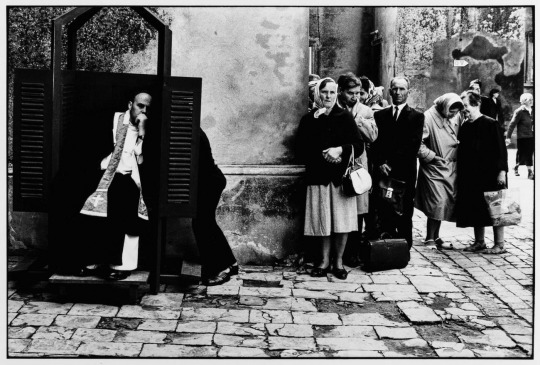
Elliott Erwitt. Czestochowa, Poland. 1964
I Am Collective Memories • Follow me, — says Visual Ratatosk
#BW#Black and White#黒と白#Schwarz und weiß#Noir et blanc#Preto e branco#vintage#retro#retrô#millésime#rétro#antik#ヴィンテージ、レトロ#Elliott Erwitt#Czestochowa#Poland#1964#1960s#60s#religion#Catholicism#Polska#Polska Rzeczpospolita Ludowa#PRL#street photography#Photographie de rue#Strassenfotografie#fotografia de rua#ストリートフォトグラフィー#cities
81 notes
·
View notes
Text







O...... HOW THE MIGHTY HAVE FALLEN 🤲🏾
#FIGHTING FOR#DANG MOPS#SUPREME#GRAFF#ART#SHELLS#ARCTERYX#INKI#NTER#GUNS#REVOLUTION#STREET RELIGION#SPRAY PAINT#PAINT#HARM8
4 notes
·
View notes
Text
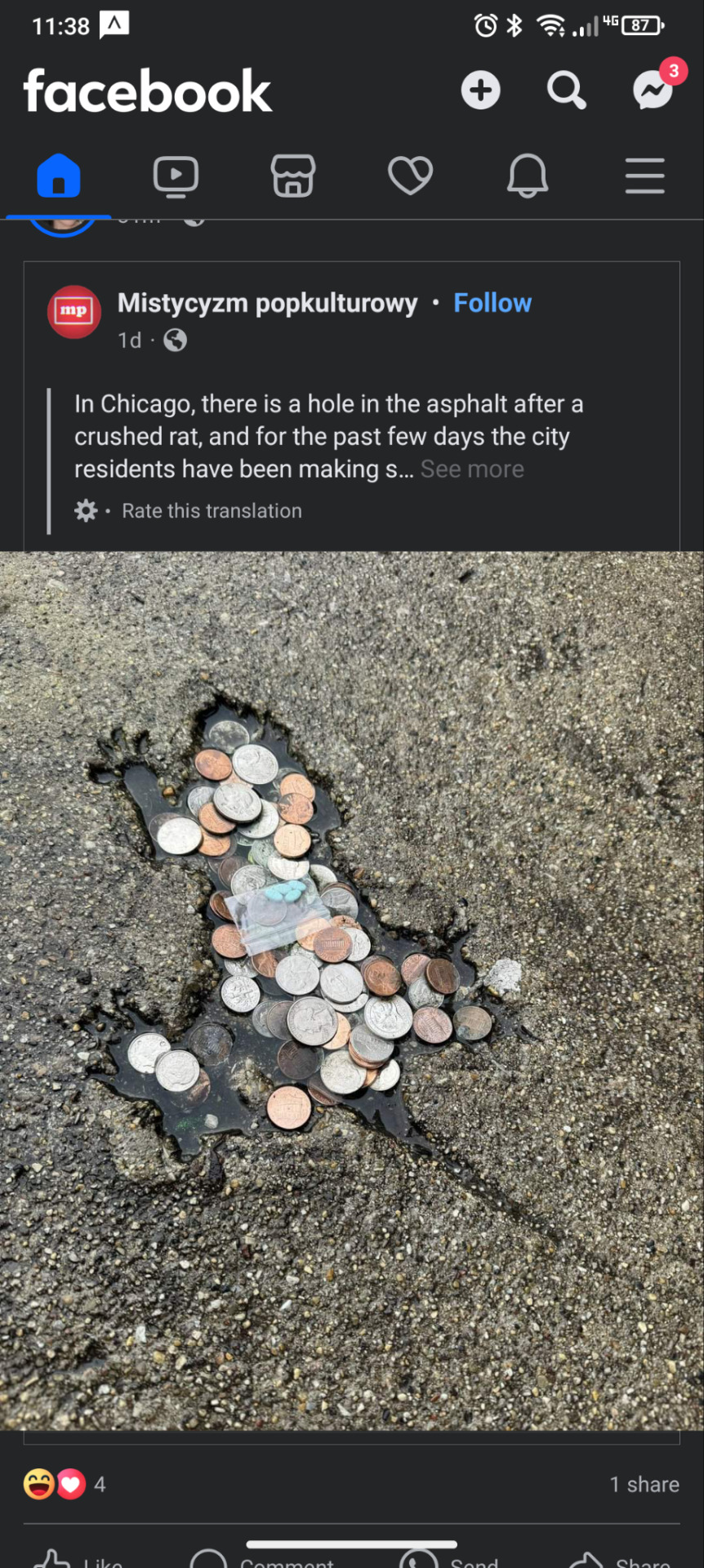
RAT GOD
#Ooc#Rat#Rat god#Rat religion#Ratsputin#God of the streets#There is poetry here#We are all the rat#Crushed by an uncaring system#Into death and submission#That is why they remember
131 notes
·
View notes
Text
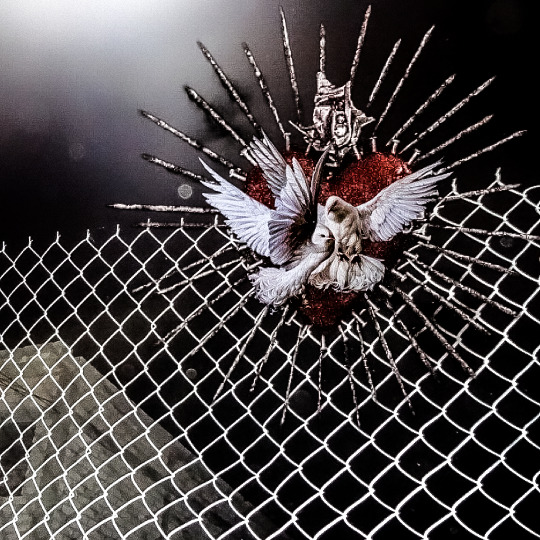
#art#collage#core#emo#goth#drain gang#weirdcore#webcore#wound#ethel cain#street#grunge#catholiccore#catholiscism#religion#netcore#liminal#cyber sigilism#gothic#dark aesthetic#2014 aesthetic#aesthetic
72 notes
·
View notes
Text
Speaking of GW1 and GW2 ... I've had plenty of complaints over the years about how GW2 has chosen to handle and retcon human-centric GW1 lore, the framing of the human gods, etc. That said, I've recently been appreciating that GW2 has retained a particular element of GW1's treatment of humanity and their gods that I've always really liked.
Humans in the GW universe are not really generic everymen, as humans so often are in fantasy settings. Nor are they so wildly varying and unpredictable that there's no sense of humanity having its own distinct flavor like the other playable species do. In many ways, they occupy a vaguely "elvish" position in the world—they've been on this world for a very long time and used to be a major power, or rather, made up many major powers with various warring factions that sometimes found common cause.
But in more recent eras, many of the ancient human civilizations have dwindled and/or suffered various atrocities and/or lost their minds. And culturally, humans tend to have a strong affinity for the mystical and even more for the divinely mystical, which their political power in previous eras was directly tied to. The vast majority of humans in this world are faithful worshippers of a human pantheon of six gods (formerly five).
Not all humans are magical or religious, to be sure, but a lot of them are, to the point that this seems their most distinctive cultural quality. Minor NPCs tend to have background dialogue invoking the gods ("By the Six!"), or referencing one of the gods (often but not only the goddess Dwayna, leader of the Six). The main human NPC of the core game, Logan Thackeray, continually references the gods, as do most of his military fellows.
Most interestingly, though, if you choose to play a human, you will automatically be a devout adherent of the faith of the Six regardless of any other choices you make. In addition, human PCs are blessed by one specific god among the Six whom you choose at character creation.
This mostly has minor flavor effects in practice. A priest of the god you chose permanently hangs out in your home district, and sometimes other priests of your god can perceive some mark of their deity's favor when they look at you.
Howeverrrrr, when I say "their deity," I don't mean that they exclusively worship the god they've dedicated their lives to, or that "your god"—the god whose favor you enjoy as a human PC—is your god in any remotely monotheistic way. Humans faithful to the Six are faithful to all the Six until one of the gods falls to evil. And when that god becomes the villain of the second GW2 expansion, various human NPCs are shown going through a crisis of the soul regardless of whether he was their particular patron or not. Having a more specific personal tie to one of the gods, or being particularly blessed by one of them, or being specifically devoted to a life of service to one of them, does not in any way prevent humans from devotion to the rest of the pantheon.
Mechanically, this means that no matter which deity you choose as your particular patron, your human PC starts the game with the ability to pray to Dwayna, goddess of life and air and healing. When you pray to her, a blue image of Dwayna materializes, heals you, and vanishes. As you level up, your human-based skills will extend to prayers to the other gods.
Praying to Lyssa, goddess of illusion/chaos magic and water and beauty, confounds foes by inflicting random conditions on them and random blessings on you. Praying to Kormir, goddess of spirit, order, and truth, will free you from negative effects like immobilization. The final prayer you can use, iirc, and the most powerful, is the prayer to Balthazar, the god of fire and war who ends up going super evil. If you're playing a fragile class like an elementalist or mesmer, praying to him is actually great, because he blesses you with two fierce hounds made of flame who fight alongside you and soak up damage. (Praying to Balthazar does feel a lot weirder in retrospect, I'll admit.)
In any case, the point is that you can pray to ANY human god and receive a brief visitation from that god, because the entire human pantheon are your gods even if you're only special to one of them. A similar dynamic is at work for NPCs as well. A recurring NPC in the core GW2 story, for instance, is Rhie, a priestess of Grenth, god of cold, darkness, judgment, and death (he's not evil, just goth). Even by priest of Grenth standards, Rhie is greatly favored by him, and as a result is able to perform powerful rituals dealing with the boundaries between life and death. But there's no expectation that this means she should abjure the other gods in any way, and she certainly does not (in fact, she provides a Human Religion 101 rundown about the gods in general in her first appearance in the human storyline).
And it's so common in fantasy, I feel, that polytheistic cultures are conceptualized as giving adherents a wider choice of gods to be the one they actually worship for real, often with the implication that worshipping one god in the pantheon naturally translates into hostility or apathy towards other gods in the same pantheon. And so I do enjoy playing a religiously devout character who has a special patron deity blessing her and who is emphatically polytheistic throughout her entire original storyline.
#i don't even remember how pof plays for human characters and i'm not going to look. but looking forwards to it tbh#especially because i imagine gwen as particularly faithful to the six; the street origin pcs get some markedly devout remarks#yeah lyssa is the one who went out of her way to bless gwen but that never stopped gwen from praying to balthazar before#the hounds of balthazar rock for a mid level illusionist actually! lyssa understands using whatever tools are available!#anghraine babbles#long post#ascalonian grudgeblog#anghraine's gaming#cw religion#sff blogging#guild wars 2#i will admit that i think it'd be cool if the blessing of a literal god had more of an impact#the human gods are incredibly powerful beings!#or alternately i think it would be cool if the human pc isn't particularly blessed by the gods and just generically devout#and instead they choose a more specific cultural background#normally you can only select an ascalonian elonian canthan or krytan background if you choose one specific storyline#and it affects almost nothing#even though the city you come from is mostly organized around the different human diaspora communities so it's still very much a thing#but that said i do like that it's very clear that you can have a special relationship with one of the gods#without that making them the only one of the pantheon who matters to you#anghraine's meta#priestess rhie
37 notes
·
View notes
Text

30 notes
·
View notes
Text

Shambala, 2024
#original photographers#photographers on tumblr#travel#mongolia#street photography#streetphoto color#brown aesthetic#little girl#ancient architecture#religion#buddhism
35 notes
·
View notes